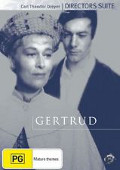
Directed by
Carl Dreyer
152 minutes
Rated PG
Reviewed by
Bernard Hemingway


Gertrud
Carl Dreyer's last film was largely written off at the time of its release in the heyday of Nouvelle Vague as the work of a man in his dotage (the director was nearly eighty) but has since been deservedly rehabilitated.
Gertrud (Nina Pens Rode) is a beautiful, one-time singer married to a careerist lawyer (Bent Rothe). Neglected by him she has fallen for a young concert pianist/composer (Baard Owe) who despite her devotion to him only regards her as a passing fling. Meanwhile a former lover (Ebbe Rode) comes back into her life and asks her to abscond with him. Rode, in the last film of a short career (she made six films between 1951 and 1964), is a remarkable presence who shines in her portrayal of Gertrud, a charismatic intelligent, self-possessed woman with an ideal of love that no man in the real world is able to satisfy.
Dreyer, who is well known for his empathy for female characters, sets the story, adapted by him from a1906 play by Hjalmar Soberberg, at the turn of the century when the social position of women was clearly fixed in patriarchal society as simultaneously an object of veneration and subjection.. In this respect the film is reminiscent of Virginia Woolf’s feminist analysis of women’s lot in 'A Room Of One’s Own' as well as Henrik Ibsen"s 'A Dolls House'.
None of Gertrud’s would-be lovers can come to terms with her idealist perception of love, one which we see at the film’s end leads her to a monastic retreat from the world. The film is also a remarkable account of the mystic perception of love, one that defies materialist logic and which Dreyer had already explored in a different context in his best-known film, La Passion De Jeanne D’Arc (1927)
Dreyer gives the story not just a subdued treatment but one which is so leached of conventional dramatics that when characters do resort to some form of emotional expression, as when Gertrud tears up a note she finds in which Gabriel has identified his work as more important than her, it is quite a violent effect. When this scene is echoed later in the film by her husband’s action it is no less shocking. Although at one level representative of the emotionally-repressed world of the middle class of hte time and in this sense comparable with the Sirkian melodrama, Dreyer’s formal reductiveness and performative stylizations transports the story to a more metaphysical plane, nowhere more clearly expressed than in the remarkable scene in which Gertrud tells her pianist lover that life is dream.
Gertrud is an extraordinary meditation on the impossibility of love given marvellous cinematic form.
Want something different?





